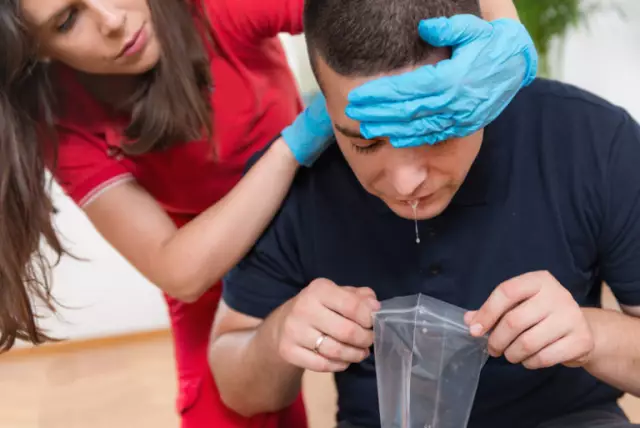- Author Rachel Wainwright wainwright@abchealthonline.com.
- Public 2023-12-15 07:39.
- Last modified 2025-11-02 20:14.
Tomato poisoning
Tomatoes are rich in nutrients: vitamins, trace elements, fiber. They contain lycopene, an antioxidant that prevents the development of cancer. Tomatoes are present in the diet of modern people almost all year round. Unfortunately, they can also become the cause of poisoning.

Source: depositphotos.com
How does tomato poisoning happen?
Tomatoes can be contaminated with pathogens during growth, maturation, harvesting, transportation and storage. If a vegetable is poorly washed before eating it, microbes get inside, where they produce toxins that cause inflammation in the mucous membranes of the stomach and intestines. Clinically, this is manifested by gastroenteric syndrome.
Another cause of tomato poisoning can be heavy metal salts. They accumulate in plants when they are grown along busy highways or in ecologically unfavorable places, for example, near chemical plants. Salts of heavy metals, getting into the body with tomatoes, cause damage to internal organs.
It is dangerous to eat unripe tomatoes, as they contain the poison solanine. This substance has a toxic effect on the nervous system and also causes hemolysis (destruction of red blood cells). The products of hemolysis enter the renal tubules and block them, causing renal dysfunction.
In an effort to get a larger yield, some unscrupulous farmers abuse mineral fertilizing. This leads to the accumulation of nitrates in tomatoes, which, once in the body, disrupt the process of tissue respiration, causing a breakdown in the functions of almost all organs and systems.
Poisoning symptoms
The clinical picture of tomato poisoning depends on the cause of the poisoning.
Poisoning caused by tomatoes infected with pathogenic microflora is characterized by symptoms of food poisoning:
- cramping abdominal pain;
- nausea and vomiting;
- diarrhea;
- increased body temperature;
- increased feeling of thirst;
- general weakness;
- headache;
- muscle pain.
In case of poisoning with tomatoes with a high content of heavy metal salts (thallium, mercury, cadmium, lead), the victims are observed:
- flatulence;
- stomach ache;
- irritation of the mucous membranes of the mouth and upper respiratory tract;
- diarrhea;
- impaired liver and kidney function.
In case of poisoning with tomatoes containing a large amount of nitrates, there are:
- nausea and vomiting;
- diarrhea, in which the feces contain an admixture of blood or acquire a chocolate color;
- cyanosis of the nail beds and lips.
Solanine poisoning when eating unripe tomatoes is manifested:
- cramping abdominal pain;
- nausea and vomiting;
- severe weakness;
- diarrhea with offensive stool;
- bitterness and burning sensation in the mouth;
- dilated pupils;
- increased salivation;
- arrhythmia of pulse and respiration;
- convulsive seizures;
- impaired consciousness, up to coma.

Source: depositphotos.com
First aid for tomato poisoning
For any type of tomato poisoning, you first need to flush the stomach. To do this, they drink several glasses of salt water or a pale pink solution of potassium permanganate, after which they induce vomiting, irritating the root of the tongue. Repeat the procedure until the wash water no longer contains particles of food eaten the day before.
To reduce the absorption of the poison that has managed to penetrate the intestines, the victim is given activated charcoal, Smecta or any other enterosorbent to drink.
Vomiting and diarrhea cause the body to lose large amounts of water and salts, which leads to dehydration and increases general intoxication. To combat this phenomenon, the victims are given a solution of Rehydron, Rehydration salt, Peditrala to drink, and if they are not at hand, then weak black tea or water. The liquid should be taken often in small sips, so drinking will not provoke increased nausea and vomiting.
When is medical attention needed?
Most often, tomato poisoning is easy. Symptoms are quickly stopped by first aid measures, and the victims do not go to the doctor. But in some situations, medical attention is needed:
- poisoning happened in a child or a pregnant woman;
- symptoms of poisoning persist for more than two days or intensify, despite the measures taken;
- intense abdominal pain;
- excessive hypotension and weakness, up to loss of consciousness;
- decrease in the amount of urine separated;
- convulsions.
Tomato poisoning therapy includes correction of disturbances in water-salt balance, detoxification. In some cases, the appointment of antibacterial drugs is indicated.
Possible consequences
Tomato poisoning is especially dangerous for children in the first years of life. Their body is very sensitive to fluid loss, dehydration can cause hypovolemic shock, acute renal failure.
After the postponed poisoning during the period of convalescence, digestive dysfunctions are often observed. To restore them, one should adhere to a dietary diet that provides mechanical and chemical sparing of the mucous membranes of the stomach and intestines. In addition, enzymatic preparations (Acidin pepsin, Festal, Mezim forte) can be prescribed.
Prevention
Preventing tomato poisoning is not difficult. To do this, follow the rules:
- tomatoes should only be purchased from certified sellers;
- do not eat unripe tomatoes that are visibly damaged, as well as have an unpleasant or unusual taste and / or odor;
- Before eating tomatoes, wash them thoroughly with running water.

Elena Minkina Doctor anesthesiologist-resuscitator About the author
Education: graduated from the Tashkent State Medical Institute, specializing in general medicine in 1991. Repeatedly passed refresher courses.
Work experience: anesthesiologist-resuscitator of the city maternity complex, resuscitator of the hemodialysis department.
The information is generalized and provided for informational purposes only. At the first sign of illness, see your doctor. Self-medication is hazardous to health!






